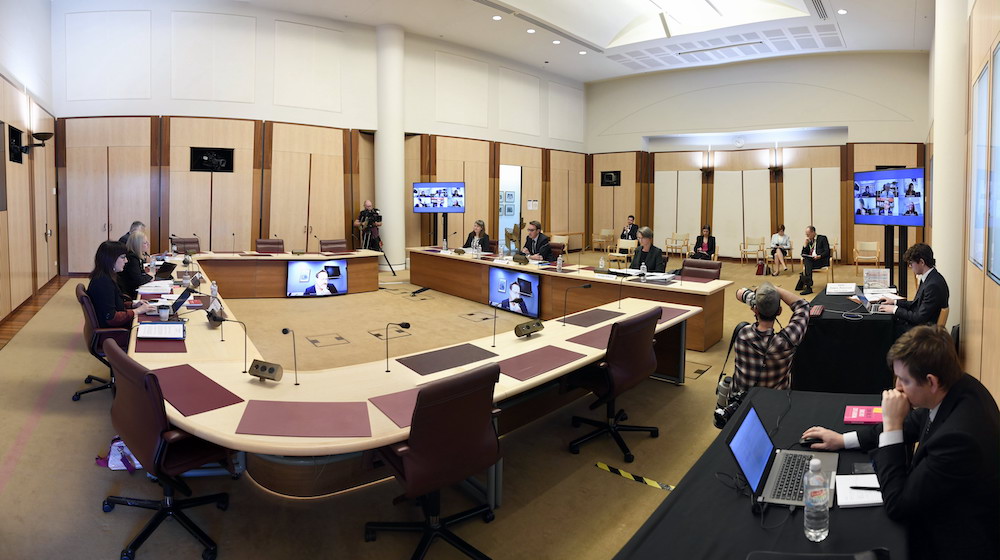RESOURCES
Submission to the now-suspended Senate Inquiry into ABC and SBS Complaints Handling
November 22, 2021 | AIJAC staff

Below is the Executive Summary of AIJAC’s submission to the now-suspended Senate Standing Committee on Environment and Communications Inquiry into ABC and SBS Complaints Handling:
Read AIJAC’s full submission (PDF)
Executive Summary
Australians have access to two national broadcasters – the Australian Broadcasting Corporation (ABC) and the Special Broadcasting Service (SBS).
Established in 1932, the ABC is one of Australia’s oldest public institutions[1], and through its various portals – TV, Radio, and online – has the potential to reach the overwhelming majority of the Australian population.
Established in 1980[2], SBS also offers a range of news and current affairs content through TV, Radio, and online platforms.
Whilst it is true that most mainstream news organisations in Australia profess a commitment to abide by the basic tenets of journalism – accuracy, balance and impartiality – as publicly funded bodies, the ABC and SBS have a statutory duty to actually do so.
The Australian Broadcasting Corporation Act 1983 Section 8(1)b states[3]:
It is the duty of the board…to ensure that the gathering and presentation by the Corporation of news and information is accurate and impartial according to the recognised standards of objective journalism.
The Special Broadcasting Service Act 1991 Section 10 lists the “Duties of the Board”, which includes[4]:
(c) to ensure, by means of the SBS’s programming policies, that the gathering and presentation by the SBS of news and information is accurate and is balanced over time and across the schedule of programs broadcast.
As two organisations that receive considerable sums of taxpayer money and have a proactive legislative imperative to ensure news and current affairs content is accurate and balanced, both broadcasters have in place formal complaints procedures[5].
Both the ABC and SBS insist they welcome complaints and that the complaints system is totally independent from interference by management or editorial staff[6].
But it is the belief of the Australia/Israel & Jewish Affairs Council (AIJAC) and other Australian stakeholders who have dealt with the respective organisations’ complaints procedures that the current system is broken and that complainants are not able to receive a fair hearing because the process is not genuinely independent.
Relevant internal ABC and SBS documentation[7] shows that their Managing Directors are the ultimate arbiters of whether to accept or reject a complaint. This demonstrates that the claim of independence of their complaints handling procedures is a fiction.
Furthermore, the ABC and SBS fund and operate the complaints procedures inhouse. The complaints handling guidelines have been developed inhouse. The staff who process the complaints are appointed by ABC and SBS management and operate inhouse.
The system is also broken because it is clear that dissatisfied complainants wanting to exercise their right to appeal ABC and SBS findings to the Australian Communications and Media Authority (ACMA) are stymied by a range of limitations preventing what is a genuinely independent body from adequately handling complaints.
This submission makes the case why the time has come for the ABC and SBS to each adopt a genuinely independent complaints process and highlights a number of different overseas models that might assist in the development of an appropriate replacement complaints process to serve in the Australian context.
[1] https://www.legislation.gov.au/Details/C1932A00014
[2] https://www.sbs.com.au/aboutus/our-history
[3] Australian Broadcasting Corporation Act 1983, Cwlth. https://www.legislation.gov.au/Details/C2020C00015
[4] https://nla.gov.au/nla.obj-799114145/view?sectionId=nla.obj-964253531&partId=nla.obj-799374821#page/n23/mode/1up
[5] https://www.abc.net.au/contact/complain.htm; https://help.sbs.com.au/hc/en-au/articles/360002027575-How-do-I-make-a-complaint-
[6] ibid
[7] www.abc.net.au/news/backstory/2021-11-15/abc-craig-mcmurtrie-on-abc-complaints-handling-inquiry/100620738; https://www.sbs.com.au/aboutus/sites/sbs.com.au.aboutus/files/sbs_code_of_practice_july_2021.pdf
Tags: ABC, Australia, Media/ Academia, SBS





